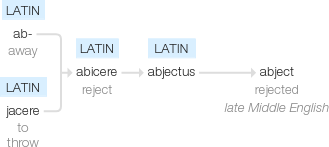Abject
late Middle English (in the sense ‘rejected’): from Latin abjectus, past participle of abicere ‘reject’, from ab- ‘away’ + jacere ‘to throw’.
wiktionary
From Middle English abiect(“outcast, wretched”), from Latin abiectus, past participle of abiciō(“to throw away, cast off, to reject”), from ab-(“away”) + iaciō(“to throw”) [1].
From Middle English abjecten, derived from the adjective form. [3]
etymonline
abject (adj.)
c. 1400, "humble, lowly, poor; of low quality; menial," from Latin abiectus "low, crouching; common, mean, contemptible; cast down, dispirited," past participle of abicere "to throw away, cast off; degrade, humble, lower," from ab "off, away from" (see ab-) + iacere "to throw" (past participle iactus; from PIE root *ye- "to throw, impel").
Figurative sense of "downcast, brought low, hopeless," is by 1510s. Also in Middle English "cast off, rejected, expelled, outcast," a sense now obsolete. Abject formerly also was a verb in English, "to cast out, expel; to degrade, humiliate" (15c.-17c.). As a noun, "base or servile person," 1530s. Related: Abjectly; abjectness.
